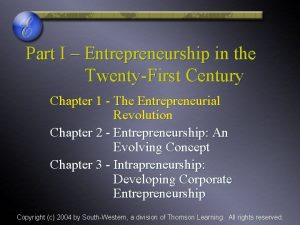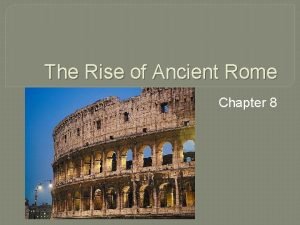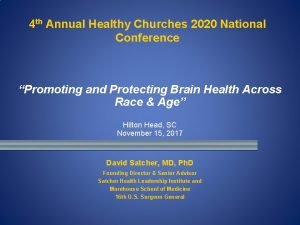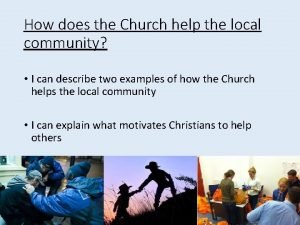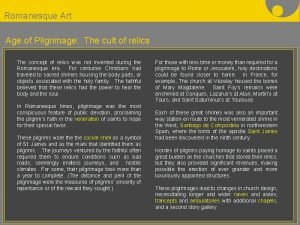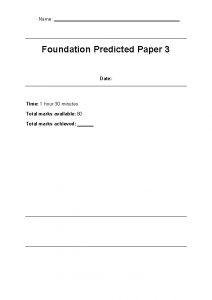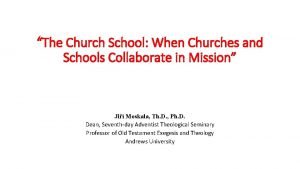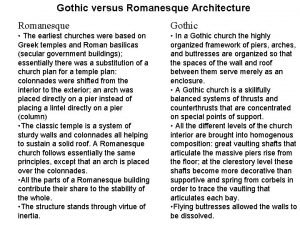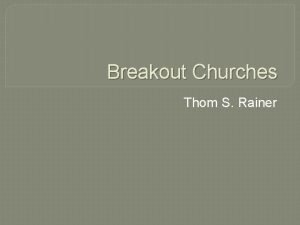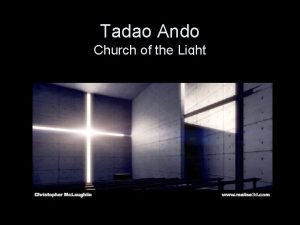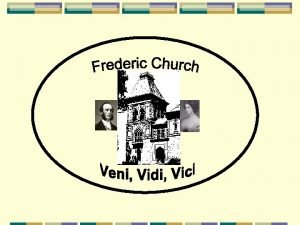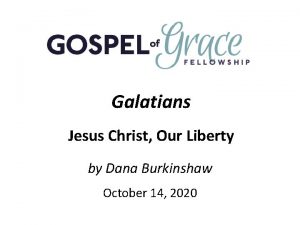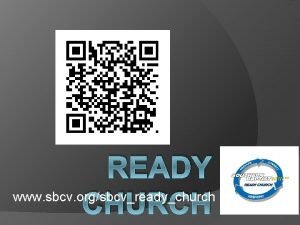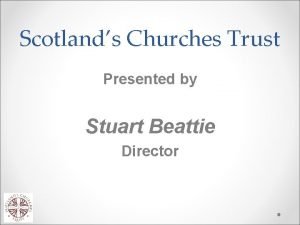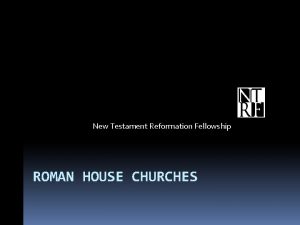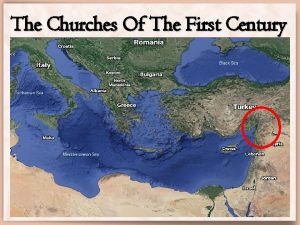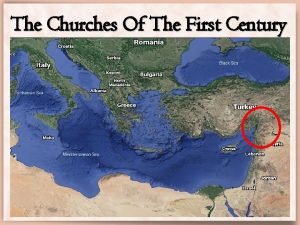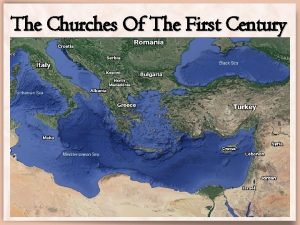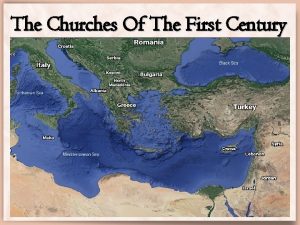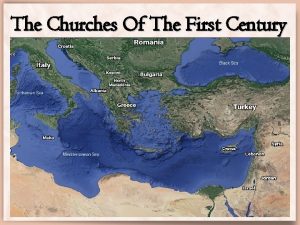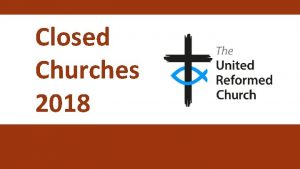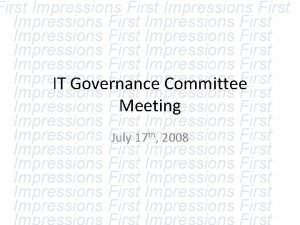The Churches Of The First Century The Churches



















- Slides: 19

The Churches Of The First Century

The Churches Of The First Century Corinth

The Churches Of The First Century Corinth

The Churches Of The First Century Corinth • This city was the commercial capital of Greece. • In 46 BC. Julius Caesar declared Corinth a Roman colony. • In Paul’s day, Corinth’s population was over ½ million people! • Corinth was 25 miles southwest of Athens and 190 miles south of Berea. • This was a very wealthy trade center.

The Churches Of The First Century Corinth • This city was known for its evil practices and sinful behavior. • To “Live like a Corinthian” was a common phrase for living a life of immorality. • Early in their history they were known for their architecture, painting, and athletes, sadly the materialistic spirit won out.

The Churches Of The First Century Corinth Gods of the People: • Aphrodite/Venus – goddess of love. • Poseidon/Neptune – god of the ocean. They worshipped other sea gods as well. • Nike/Victoria – goddess of victory, granddaughter of Poseidon • Apollo – god of light, healing, music, poetry, manly beauty, prophecy, medicine • Hermes/Mercury – messenger, god of roads.

The Churches Of The First Century Corinth Gods of the People: • Hercules/Heracles – son of Zeus, known for super-human strength, bravery, masculinity. • Athena/Minerva – goddess of wisdom, fertility, warfare • Asclepius – son of Apollo, god of healing • Hygeia – goddess of health, cleanliness, and hygiene. Daughter of Asclepius

The Churches Of The First Century The Church In Corinth The origin of this church: Acts 18: 1 -18 Paul came here after preaching? ______ Who did he meet? What did they have in common? What did Paul do here that was consistent with everywhere else he went? What was the consistent response he faced? Name some who believed the truth and were baptized.

The Churches Of The First Century The Church In Corinth How long did Paul stay in Corinth? _____ One source of encouragement was the return of Timothy and Silas (Acts 18: 5; I Thess. 3: 6 -8). God also encouraged Him (Acts 18: 9 -10). Yet, Paul was brought before Gallio (v. 12 -17). Why? …. What was the charge? Does this whole scene seems familiar? Here, he wrote I and II Thessalonians and Romans.

The Churches Of The First Century The Letters To The Church In Corinth I Corinthians was written around 56 A. D. from Ephesus, and II Corinthians was written within either the same or the following year. When we read these letters, we see a people serious and ready to change when they were taught that they were wrong.

The Churches Of The First Century The Letters To The Church In Corinth In I Corinthians, Paul: • Thanked God For The Brethren (I Cor. 1: 4 -6). • Rebuked Their Division (I Cor. 1: 10 -17, 3: 1 -15). • Explained How The Gospel Is Viewed By The World (I Cor. 1: 18 -31, 3: 18 -23).

The Churches Of The First Century The Letters To The Church In Corinth In I Corinthians, Paul: • Encouraged Them To Be Faithful Stewards (I Cor. 4). • Rebuked Them For Not Withdrawing From A Fornicator (I Cor. 5). • Rebuked Them For Going To Law With One Another (I Cor. 6: 1 -8).

The Churches Of The First Century The Letters To The Church In Corinth In I Corinthians, Paul: • Reminded Them To Control Their Fleshly Lusts (I Cor. 6: 9 -20). • Answered Questions About Marriage (I Cor. 7). • Reminded Them To Respect The Conscience Of The Weak Brother (I Cor. 8, 10).

The Churches Of The First Century The Letters To The Church In Corinth In I Corinthians, Paul: • Defended His Apostleship (I Cor. 9). • Corrected Their Sins In Reference To Worship Practices (I Cor. 11). • Taught Them About The Spiritual Gifts, As Well As Their Duration And Regulation (I Cor. 12 -14).

The Churches Of The First Century The Letters To The Church In Corinth In I Corinthians, Paul: • Corrected Their Errors Resurrection (I Cor. 15). About The • Closed The Letter And Promised To See Them Soon (I Cor. 16).

The Churches Of The First Century The Letters To The Church In Corinth In II Corinthians, Paul: • Commends Them For Their Stand (II Cor. 1). • Encourages Forgiveness Of The One Withdrawn From (II Cor. 2). • Reminded Them The Old Law Was Done Away (II Cor. 3).

The Churches Of The First Century The Letters To The Church In Corinth In II Corinthians, Paul: • Reminds Them That This Message Was In “Earthen Vessels” First (II Cor. 4). • Emphasized “Walking By Faith” And “The Ministry Of Reconciliation” In Christ (II Cor. 5). • Told Them To Not Be Caught Up With The Worldly-Minded (II Cor. 6).

The Churches Of The First Century The Letters To The Church In Corinth In II Corinthians, Paul: • Rejoiced That His First Letter Produced Its Intended Purpose – Repentance (II Cor. 7). • Commends Them For Their Generosity Toward The Brethren In Judea (II Cor. 8 -9). • Defends His Apostleship (II Cor. 10 -12). • Reminds Them To Examine Themselves As He Closes The Letter (II Cor. 13).

 Twenty first century trends in entrepreneurship
Twenty first century trends in entrepreneurship 21st century scholars pledge
21st century scholars pledge Rome chapter 8
Rome chapter 8 In the twenty-first century, sales leaders are
In the twenty-first century, sales leaders are Healthy churches 2020
Healthy churches 2020 Scottish churches housing action
Scottish churches housing action How church helps the community
How church helps the community Pilgrimage churches romanesque
Pilgrimage churches romanesque The churches the apostles left behind
The churches the apostles left behind The diagram shows the position of two churches a and b
The diagram shows the position of two churches a and b Churches and schools working together
Churches and schools working together Gothic vs romanesque
Gothic vs romanesque Mechanicsville churches emergency fund
Mechanicsville churches emergency fund Breakout churches thom rainer
Breakout churches thom rainer Tadao ando light church
Tadao ando light church Historical churches thesis statement
Historical churches thesis statement Churches of galatia map
Churches of galatia map Sbcv churches
Sbcv churches Scotland's churches trust
Scotland's churches trust House churches in the new testament
House churches in the new testament
